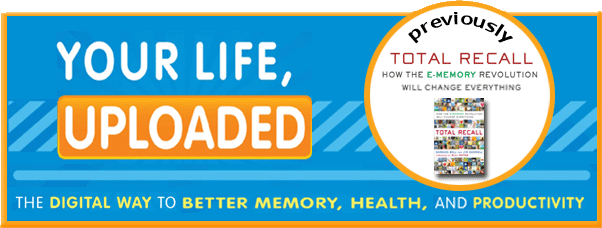Some people have honest disagreements with the ideas in Total Recall. Some agree with most of the concepts but still want to opt out. Both are just fine with us. Eric Felton’s recent column in the Wall Street Journal is different. He cherry-picks quotes and offers up misguided arguments that make it clear that his recall of our book requires more than a little augmentation. I guess this is not surprising as he advocates “selective amnesia” and the “gauzy mystery of remembrance” rather than getting “bogged down in the details.”
Felton is misleading, beginning with the title of his piece that implies that we want the authorities to have your records. In fact, we promote the opposite, calling for personal, private records stored in “Swiss data banks” and advocating laws protecting our e-memories just like our bio-memories. His opening paragraph then declares that upholding laws against secret audio/video recording would be a “blow to the grand scheme being promoted by Microsoft.” Actually, Microsoft is not promoting our book; it is our own private endeavor. We happen to work for Microsoft, and people from Microsoft have endorsed our work – but so have people from many other tech companies and universities. And laws against secret A/V recording are just fine by us, as we say in the book:
So how will we adapt to being recorded? Will it be a free-for-all? Will we pass more restrictive laws? Recording someone talking without their permission is already illegal in many places. Customs will no doubt evolve regarding when it is socially acceptable to record. In one culture, it may be good manners just to let people know you are recording. Another culture may deem lifelogging in the company of others an absolute taboo. Birthday parties might be fair game, while first dates are not.
…consent to record will be the likely direction of custom and law, and technology will be developed to this end. When several of us gather, our devices will communicate information about who is allowed to record whom.
Felton presumably remembers our chapter on memory, saying “the big benefit is that we will no longer have lapses of memory.” However, he seems to have forgotten the chapters on health, work, learning, and life/afterlife. That’s a lot to forget – almost half the book containing many benefits from better health to improved education. Instead, he fixates on continuous audio/video recording, which we aren’t especially advocating. In fact, we write:
I am not dogmatic about absolutely continuous recording. I think we will sometimes shut off the recording and say things off the record. We may even occasionally stop recording just to have the “novelty” of memories that exist only in our heads. Even so, if people only logged a tenth of their lives, the changes in society would still be dramatic.
He also seems to have no recollection of our explanation of how e-memories are fundamentally different than bio-memories. Bio-memories may come with unwanted recall, popping into your consciousness and distressing you. Not so e-memories, which can very simply be set aside to not be included in day-to-day search, browsing or screensavers. Bio-memories get cluttered and confused by too much material, while e-memories can number-crunch, detect redundancy, summarize, and tuck away the clutter where you never need to see it – until that day you discover you need that critical detail. Our credit card bills contain each and every charge – “what to record and what to discard” is not the ”definition of smarts” in this case – and we somehow not only survive such bills, we manage to avoid “self-obsession,” leaving them alone in our files (or maybe just on the server at the credit card company) until that day we need to settle an argument about a bill that has been paid. Likewise, we have avoided being self-obsessed or swamped by our call-by-call cell phone records, and have occasionally found usefulness in having a specific call recorded. For those of us who have such records in a database, they become even more convenient to make use of and even less likely to clutter up our lives.
We’d bet our lives are far less cluttered and self-obsessed than Eric Felton’s.
There are some pretty good arguments in favor of a supposed need to forget but Felton doesn’t make one of them. Instead, he puts forward the idea that athletes would be better off with “selective amnesia”, and that watching film isn’t always a good idea. Well, maybe sometimes coaches or players may decide not to watch a certain game – but they still recorded it, and may occasionally change their minds later to watch it for their benefit or just enjoyment (today’s great embarrassment may be next year’s great laugh). And the vast majority of the time, they do not rely on their fuzzy memories, but do indeed watch game film and look at cold hard statistics broken down to the umpteenth degree. A player doesn’t just say they feel a little weak in the fourth quarter lately. No, they have their shots, rebounds, blocks and so on in the fourth quarter graphed across the season. The real-world use of film and statistics by athletes from professionals down to youth leagues is evidence in favor of our thesis, not against it. In the book, we tackle some of the better arguments in favor of forgetting. Felton would have been on firmer ground extending those arguments, some of which at least have a strong emotional appeal. Perhaps he forgot them.
 Friday, November 13, 2009 at 10:13AM
Friday, November 13, 2009 at 10:13AM  Pogue,
Pogue,  reQall,
reQall,  video in
video in  Getting Started
Getting Started 
